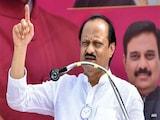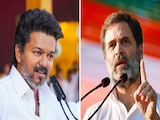If President Barack Obama wins re-election on Tuesday, the historical memory of the race might turn on the role played by Hurricane Sandy.
Some analysts are already describing the storm as an "October surprise" that allowed Obama to regain his footing after stumbling in the first presidential debate and struggling to get back on course. Some Republicans seem prepared to cast blame for a defeat for Mitt Romney on the storm and on the effusive praise of the president by Gov. Chris Christie of New Jersey and other public officials.
The theory has some appeal. The past three days have brought what is almost certainly Obama's strongest run of polling since the first presidential debate in Denver on Oct. 3. The president led in a vast majority of battleground state polls over the weekend. And it is increasingly hard to find leads for Romney in national surveys, although several of them show a tie.
When the hurricane made landfall in New Jersey on Oct. 29, Obama's chances of winning re-election were 73 per cent in the FiveThirtyEight forecast. Since then, his chances have risen to 86 per cent, close to his highs of the year.
But while the storm and the response to it may account for some of Obama's gains, they most likely do not reflect the whole story.
Obama had been slowly but steadily rebounding in the polls from his lows in early October - in contrast to a common argument that contended, without much hard evidence, that Romney still had momentum in the race.
Moreover, there are any number of alternatives to explain Obama's gains before and after the storm. He was widely seen as the winner of the second and third presidential debates in surveys of voters who watched them. The past month has brought encouraging economic news, including strong jobs reports in October and Friday. And the bounce in the polls that Romney received after the Denver debate may have been destined to fade, as polling bounces often do after political events like national conventions.
Based on figures from states that provide hard data about which party's voters have already turned out to cast ballots, Democrats have an edge in early voting. Some voters who were originally deemed by pollsters as unlikely to vote may now be included in surveys if they say they have voted early.
Both Obama and Romney have been running lots of advertisements, which could affect the vote, especially in swing states. Obama's voter-targeting operation may prove to be stronger than Romney's, and his base may have begun to show up in the polls.
The president's approval rating is at 49 or 50 per cent in many surveys, a threshold that would ordinarily predict a narrow re-election for an incumbent. Some elections "break" toward one candidate or another at the end as undecided voters tune in and begin to evaluate the choices.
Each of these hypotheses could merit its own article. But the point is that many variables may have contributed to Obama's gain in the polls.
If I had told you in January that Obama's approval rating would rise to nearly 50 percent by November from the mid-40s and that the unemployment rate would drop below 8 percent, you probably would have inferred that Obama was a favorite for re-election, with or without a hurricane and what was judged to be his strong response to it.
This is not to dismiss the effects of the hurricane entirely. But the fact that Obama's rebound in the polls has been slow and steady, rather than sudden, lends weight to some of the other potential factors, even if they make for less dramatic story lines.
Some analysts are already describing the storm as an "October surprise" that allowed Obama to regain his footing after stumbling in the first presidential debate and struggling to get back on course. Some Republicans seem prepared to cast blame for a defeat for Mitt Romney on the storm and on the effusive praise of the president by Gov. Chris Christie of New Jersey and other public officials.
The theory has some appeal. The past three days have brought what is almost certainly Obama's strongest run of polling since the first presidential debate in Denver on Oct. 3. The president led in a vast majority of battleground state polls over the weekend. And it is increasingly hard to find leads for Romney in national surveys, although several of them show a tie.
When the hurricane made landfall in New Jersey on Oct. 29, Obama's chances of winning re-election were 73 per cent in the FiveThirtyEight forecast. Since then, his chances have risen to 86 per cent, close to his highs of the year.
But while the storm and the response to it may account for some of Obama's gains, they most likely do not reflect the whole story.
Obama had been slowly but steadily rebounding in the polls from his lows in early October - in contrast to a common argument that contended, without much hard evidence, that Romney still had momentum in the race.
Moreover, there are any number of alternatives to explain Obama's gains before and after the storm. He was widely seen as the winner of the second and third presidential debates in surveys of voters who watched them. The past month has brought encouraging economic news, including strong jobs reports in October and Friday. And the bounce in the polls that Romney received after the Denver debate may have been destined to fade, as polling bounces often do after political events like national conventions.
Based on figures from states that provide hard data about which party's voters have already turned out to cast ballots, Democrats have an edge in early voting. Some voters who were originally deemed by pollsters as unlikely to vote may now be included in surveys if they say they have voted early.
Both Obama and Romney have been running lots of advertisements, which could affect the vote, especially in swing states. Obama's voter-targeting operation may prove to be stronger than Romney's, and his base may have begun to show up in the polls.
The president's approval rating is at 49 or 50 per cent in many surveys, a threshold that would ordinarily predict a narrow re-election for an incumbent. Some elections "break" toward one candidate or another at the end as undecided voters tune in and begin to evaluate the choices.
Each of these hypotheses could merit its own article. But the point is that many variables may have contributed to Obama's gain in the polls.
If I had told you in January that Obama's approval rating would rise to nearly 50 percent by November from the mid-40s and that the unemployment rate would drop below 8 percent, you probably would have inferred that Obama was a favorite for re-election, with or without a hurricane and what was judged to be his strong response to it.
This is not to dismiss the effects of the hurricane entirely. But the fact that Obama's rebound in the polls has been slow and steady, rather than sudden, lends weight to some of the other potential factors, even if they make for less dramatic story lines.
© 2012, The New York Times News Service















